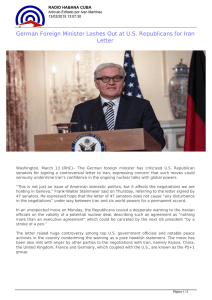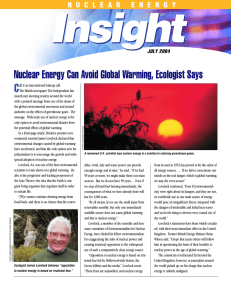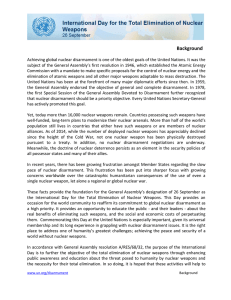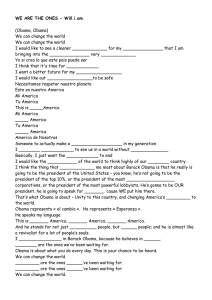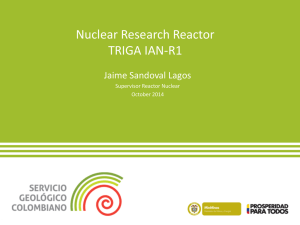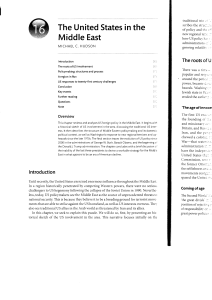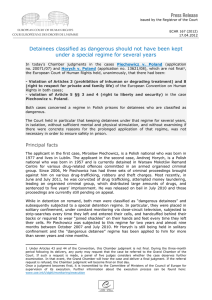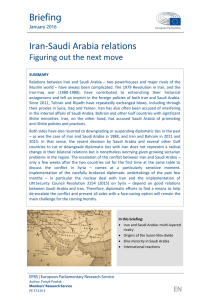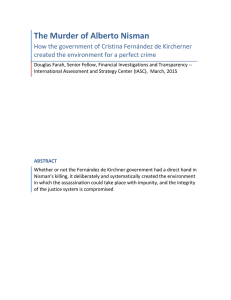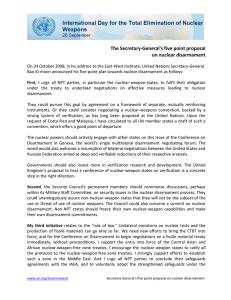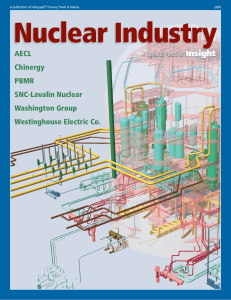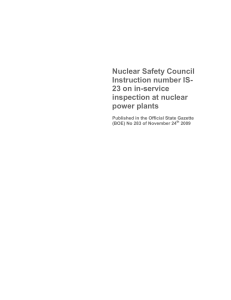where do we stand on the nuclear negotiation between iran
Anuncio
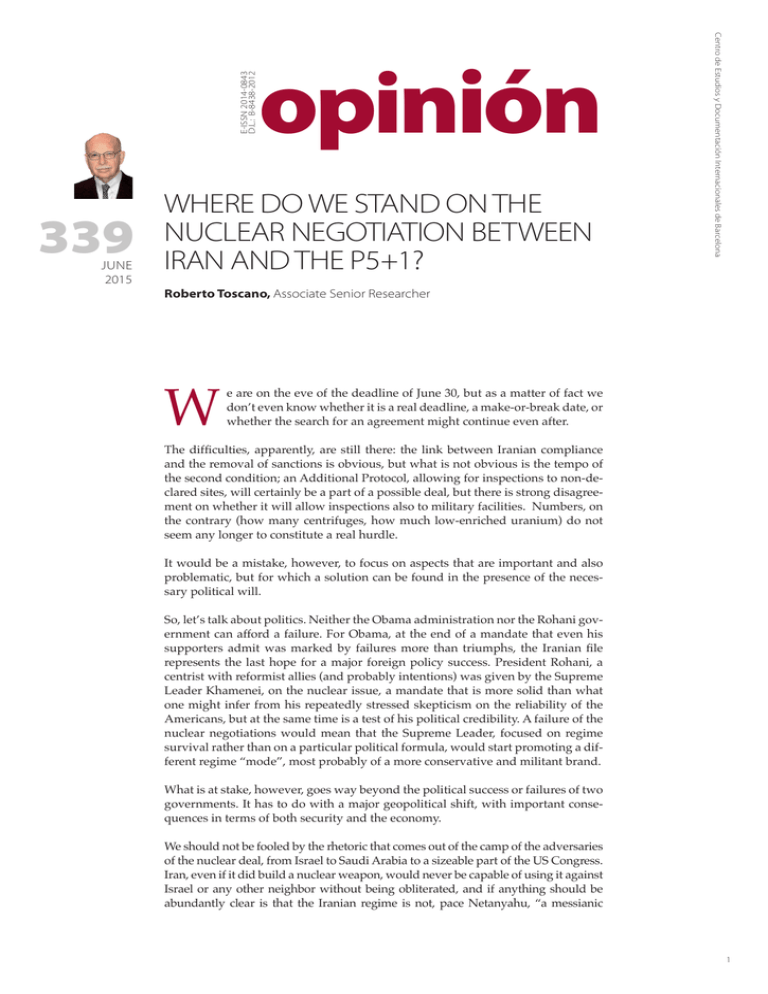
E-ISSN 2014-0843 D.L.: B-8438-2012 JUNE 2015 WHERE DO WE STAND ON THE NUCLEAR NEGOTIATION BETWEEN IRAN AND THE P5+1? Centro de Estudios y Documentación Internacionales de Barcelona 339 opinión Roberto Toscano, Associate Senior Researcher W e are on the eve of the deadline of June 30, but as a matter of fact we don’t even know whether it is a real deadline, a make-or-break date, or whether the search for an agreement might continue even after. The difficulties, apparently, are still there: the link between Iranian compliance and the removal of sanctions is obvious, but what is not obvious is the tempo of the second condition; an Additional Protocol, allowing for inspections to non-declared sites, will certainly be a part of a possible deal, but there is strong disagreement on whether it will allow inspections also to military facilities. Numbers, on the contrary (how many centrifuges, how much low-enriched uranium) do not seem any longer to constitute a real hurdle. It would be a mistake, however, to focus on aspects that are important and also problematic, but for which a solution can be found in the presence of the necessary political will. So, let’s talk about politics. Neither the Obama administration nor the Rohani government can afford a failure. For Obama, at the end of a mandate that even his supporters admit was marked by failures more than triumphs, the Iranian file represents the last hope for a major foreign policy success. President Rohani, a centrist with reformist allies (and probably intentions) was given by the Supreme Leader Khamenei, on the nuclear issue, a mandate that is more solid than what one might infer from his repeatedly stressed skepticism on the reliability of the Americans, but at the same time is a test of his political credibility. A failure of the nuclear negotiations would mean that the Supreme Leader, focused on regime survival rather than on a particular political formula, would start promoting a different regime “mode”, most probably of a more conservative and militant brand. What is at stake, however, goes way beyond the political success or failures of two governments. It has to do with a major geopolitical shift, with important consequences in terms of both security and the economy. We should not be fooled by the rhetoric that comes out of the camp of the adversaries of the nuclear deal, from Israel to Saudi Arabia to a sizeable part of the US Congress. Iran, even if it did build a nuclear weapon, would never be capable of using it against Israel or any other neighbor without being obliterated, and if anything should be abundantly clear is that the Iranian regime is not, pace Netanyahu, “a messianic 1 apocalyptic cult”, but rather a very realistic (even cynical) oligarchy focused on its own survival and a cost-benefit analysis in terms of power and advantage. What the adversaries of the nuclear deal want to prevent is not so much a nuclear Iran but rather a “normal” Iran, meaning a country that, no longer isolated, will be able to play its role, and pursue its interests, on a regional scale. Iran has indeed the potential (military, economic and cultural) to be a major player in the region. It is quite legitimate to be wary of Iranian hegemony – incidentally, a concern that is not tied to the Islamic regime, but was just as strong at the time of the Pahlavi dynasty. But if Iranian hegemony is not acceptable, Iranian exclusion does not seem to be possible. Or rather, it is only possible if one is ready to pay a very, very high price. In order to assess what kind of price, it is sufficient to look at Saudi policy, geared to a single-minded, overarching anti-Iranian priority. A priority which explains the irresponsible (and potentially self-damaging) support to the most extreme Sunni jihadists. And it is also Israel that seems to be guided by the principle “any enemy of Iran is my friend” as proved for instance by its acceptance of al-Nusra (i.e. Al-Qaida) fighters in its hospitals just across the border from Syria, while some right-wing commentators in the US are inviting the Obama administration to be more flexible, given the practical non-existence of the so-called “moderate Syrian fighters”, in considering the possibility to support radical jihadists, including those related to Al-Qaida, in order to defeat Assad – a dictator that never represented a threat to US interests and even to Israeli security but who has to be eliminated since he is an ally of Tehran. The choice is stark, and momentous. Who constitutes the most dangerous threat to stability throughout the Middle East: Iran or Sunni jihadism, today under the growing influence of the Islamic State? Can Iran, in the pursuit of its own national interest, be considered a partner in the defeat of ISIS? In a way it already is, since it has been mainly its support to the shaky Iraqi government (together with the significant contribution of the Kurds) that has prevented the black flags of ISIS to reach Baghdad. Strange bedfellows in the Middle East: Israel and Al-Qaida affiliated jihadists; the US and the Iranian Pasdaran; Israel and the Saudis. Iranians know what they want, and paradoxically both regime and anti-regime agree on the need for the country to break through the present isolation and become a “normal” country. Not necessarily democratic nor friendly to the US, but normal in the sense that China has become after breaking its Maoist isolation. The main dangers for an agreement relate to the US Congress, where a radically negative and suspicious attitude toward Iran is the product both of history (the never-overcome memory of the American hostages) and of the influence of what is called the “Jewish lobby” but which – considered the fact that public opinion polls show that a majority of American Jews favors an agreement – should rather be called “pro-Likud wealthy Jewish campaign funders lobby”. But also in Tehran not everybody is in favor of a nuclear agreement. A radical wing of the regime (a minority, but not an irrelevant or powerless one) does not really care that much about having or not having a nuclear weapon, but is afraid that “a normal Iran” could become a creeping democratic Iran, one in which the end of isolation would increase the internal demand for an open economy (versus the present combination of state control and crony capitalism, both a boon for many in the regime) and more freedom for citizens including the dreaded loosening of Islamic norms on lifestyle issues and women’s dress codes. No, it is definitely not about the bomb. 2
